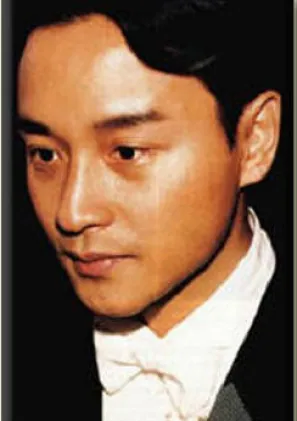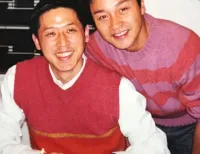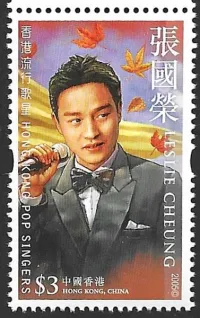Biography
1956 - 2003
Hong Kong heartthrob, pop music and film star Leslie Cheung first gained attention after capturing 2nd place in the 1976 ATV Asian Music Contest. However, it was not until signing with Capital Artists in 1982 that he became a bona fide star with songs like ‘Monica,’ which ushered in the Cantopop music craze. In addition to a prolific output of hit music, Cheung began making films. His performance in John Woo’s ‘A Better Tomorrow’ (1986) and its sequel made him an indisputable movie star. Other notable Cheung films of this era were ‘Days of Being Wild’ and ‘A Chinese Ghost Story.’ In the years that followed he won several top Hong Kong film Awards. In 1989 Cheung announced his retirement from singing and held 33 continuous nights of concerts before moving to Canada. In 1993 he starred in ‘Farewell My Concubine’ - the 1st Chinese film to win The Golden Palm Award at the Cannes Film Festival. In it he played a Beijing opera singer who finds fame playing female roles. In addition to his hot film career, he returned to making music in 1995. This period marked a clear shift in his public stance on his sexuality. During promotion for a subsequent film, ‘Happy Together’ (1997) – about two gay lovers in Argentina – Cheung came out as bisexual in TIME Magazine. That same year he revealed Daffy Tong Hok-Tak was his romantic partner. Balancing films and music he remained at the forefront of Hong Kong entertainers with hugely successful tours in 1999 and 2000. In spite of his outward success Cheung, who had been battling clinical depression for several years, ended his life – stunning his nation. Tong – his “most beloved” – was listed as his surviving spouse in the full-page Hong Kong obituary. Over 10,000 attended his memorial service and his popularity remains undiminished
1956 - 2003
Hong Kong heartthrob, pop music and film star Leslie Cheung first gained attention after capturing 2nd place in the 1976 ATV Asian Music Contest. However, it was not until signing with Capital Artists in 1982 that he became a bona fide star with songs like ‘Monica,’ which ushered in the Cantopop music craze. In addition to a prolific output of hit music, Cheung began making films. His performance in John Woo’s ‘A Better Tomorrow’ (1986) and its sequel made him an indisputable movie star. Other notable Cheung films of this era were ‘Days of Being Wild’ and ‘A Chinese Ghost Story.’ In the years that followed he won several top Hong Kong film Awards. In 1989 Cheung announced his retirement from singing and held 33 continuous nights of concerts before moving to Canada. In 1993 he starred in ‘Farewell My Concubine’ - the 1st Chinese film to win The Golden Palm Award at the Cannes Film Festival. In it he played a Beijing opera singer who finds fame playing female roles. In addition to his hot film career, he returned to making music in 1995. This period marked a clear shift in his public stance on his sexuality. During promotion for a subsequent film, ‘Happy Together’ (1997) – about two gay lovers in Argentina – Cheung came out as bisexual in TIME Magazine. That same year he revealed Daffy Tong Hok-Tak was his romantic partner. Balancing films and music he remained at the forefront of Hong Kong entertainers with hugely successful tours in 1999 and 2000. In spite of his outward success Cheung, who had been battling clinical depression for several years, ended his life – stunning his nation. Tong – his “most beloved” – was listed as his surviving spouse in the full-page Hong Kong obituary. Over 10,000 attended his memorial service and his popularity remains undiminished
Demography
Demography
Gender Male
Sexual Orientation Bisexual
Gender Identity Cisgender
Ethnicity Asian/Pacific Rim
Nations Affiliated Hong Kong SAR China Canada
Era/Epoch Information Age (1970-present)
Field(s) of Contribution
Film
Music
Social Justice
Commemorations & Honors
Jade Solid Gold Best Ten Music Awards Most Popular Male Artist Award (1988)
Jade Solid Gold Best Ten Music Awards Most Popular Male Artist Award (1989)
Hong Kong Film Award For Days of Being Wild (1991)
Golden Horse Award Best Original Song For The Bride With White Hair (1993)
Hong Kong Film Critics Society Award For Ashes of Time (1994)
Japan Film Critics Society Award For Best Actor For Farewell My Concubine (1994)
Hong Kong Film Critics Society Award For He's A Woman She's A Man (1995)
RTHK Top 10 Gold Songs Awards Golden Needle Award (1999)
Jade Solid Gold Best Ten Music Awards Four Channel Award Best Album of the Year For Untitled (2000)
Hong Kong Postal Service Commemorative Stamp (2005)
RTHK Top 10 Gold Songs Awards Silver Jubilee Award (2005)
Asteroid 55383 Cheungkwokwing Named For Him (2018)
Demography
Gender Male
Sexual Orientation Bisexual
Gender Identity Cisgender
Ethnicity Asian/Pacific Rim
Nations Affiliated Hong Kong SAR China Canada
Era/Epoch Information Age (1970-present)
Field(s) of Contribution
Film
Music
Social Justice
Commemorations & Honors
Jade Solid Gold Best Ten Music Awards Most Popular Male Artist Award (1988)
Jade Solid Gold Best Ten Music Awards Most Popular Male Artist Award (1989)
Hong Kong Film Award For Days of Being Wild (1991)
Golden Horse Award Best Original Song For The Bride With White Hair (1993)
Hong Kong Film Critics Society Award For Ashes of Time (1994)
Japan Film Critics Society Award For Best Actor For Farewell My Concubine (1994)
Hong Kong Film Critics Society Award For He's A Woman She's A Man (1995)
RTHK Top 10 Gold Songs Awards Golden Needle Award (1999)
Jade Solid Gold Best Ten Music Awards Four Channel Award Best Album of the Year For Untitled (2000)
Hong Kong Postal Service Commemorative Stamp (2005)
RTHK Top 10 Gold Songs Awards Silver Jubilee Award (2005)
Asteroid 55383 Cheungkwokwing Named For Him (2018)
Resources
Resources
Bergan, Ronald. "Leslie Cheung: Asian Actor and Pop Star Famed for His Androgynous Performances on Stage and Screen." The Guardian (London) (April 5, 2003): 23.
Carr, Jay. "'Farewell My Concubine' Holds an Unflattering Mirror to China." Boston Globe (October 29, 1993): 51.
Corliss, Richard, and Stephen Short. "Forever Leslie." Time (International Edition) (May 7, 2001): 44.
Goodman, Peter S. "Farewell to a Troubled Star and a City's High Times." Washington Post (April 5, 2003): C1.
Hartl, John. "'Farewell My Concubine' Latest Film to Explore World of Sexual Ambiguity--a First for China." Seattle Times (October 24, 1993): F1.
Holden, Stephen. "A 'Gone with the Wind' in China, without War." New York Times (October 5, 1996): Sec. 1, 19.
Hunter, Allan. "Leslie Cheung." The Scotsman (April 3, 2003): 16.
Mizui, Yoko. "Gender Bender from H.K." The Daily Yomiuri (November 30, 1995): 23.
Rayns, Tony. "Leslie Cheung; Pop singer and star of 'Farewell My Concubine.'" The Independent (London) (April 3, 2003): 20.
Stuart, Jan. "Happy Together." The Advocate 746 (November 11, 1997): 67.
http://en.wikipedia.org/wiki/Leslie_Cheung
https://www.imdb.com/name/nm0002000/bio
https://www.makingqueerhistory.com/articles/2019/11/4/leslie-cheung
http://content.time.com/time/subscriber/article/0,33009,108021,00.html
https://www.billboard.com/articles/news/71723/hong-kong-actor-leslie-cheung-dies
https://www.bbc.com/news/world-asia-china-43637749
https://www.britannica.com/biography/Leslie-Cheung
https://www.theguardian.com/news/2003/apr/05/guardianobituaries
Resources
Bergan, Ronald. "Leslie Cheung: Asian Actor and Pop Star Famed for His Androgynous Performances on Stage and Screen." The Guardian (London) (April 5, 2003): 23.
Carr, Jay. "'Farewell My Concubine' Holds an Unflattering Mirror to China." Boston Globe (October 29, 1993): 51.
Corliss, Richard, and Stephen Short. "Forever Leslie." Time (International Edition) (May 7, 2001): 44.
Goodman, Peter S. "Farewell to a Troubled Star and a City's High Times." Washington Post (April 5, 2003): C1.
Hartl, John. "'Farewell My Concubine' Latest Film to Explore World of Sexual Ambiguity--a First for China." Seattle Times (October 24, 1993): F1.
Holden, Stephen. "A 'Gone with the Wind' in China, without War." New York Times (October 5, 1996): Sec. 1, 19.
Hunter, Allan. "Leslie Cheung." The Scotsman (April 3, 2003): 16.
Mizui, Yoko. "Gender Bender from H.K." The Daily Yomiuri (November 30, 1995): 23.
Rayns, Tony. "Leslie Cheung; Pop singer and star of 'Farewell My Concubine.'" The Independent (London) (April 3, 2003): 20.
Stuart, Jan. "Happy Together." The Advocate 746 (November 11, 1997): 67.
http://en.wikipedia.org/wiki/Leslie_Cheung
https://www.imdb.com/name/nm0002000/bio
https://www.makingqueerhistory.com/articles/2019/11/4/leslie-cheung
http://content.time.com/time/subscriber/article/0,33009,108021,00.html
https://www.billboard.com/articles/news/71723/hong-kong-actor-leslie-cheung-dies
https://www.bbc.com/news/world-asia-china-43637749
https://www.britannica.com/biography/Leslie-Cheung
https://www.theguardian.com/news/2003/apr/05/guardianobituaries









